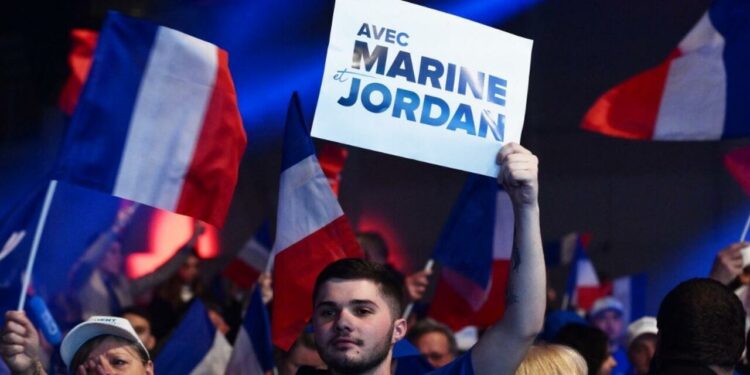Issued on: 26/09/2024 – 17:47
4 min
Central and Eastern European countries are increasingly questioning the multicultural ideals promoted by Western Europe, the European Council on Foreign Relations (ECFR) and the European Cultural Foundation (ECF) conclude.
Their report, published on Wednesday, suggests that these countries, which joined the EU more recently, are challenging the bloc’s self-image by highlighting a more ethnic and nationalist view of European identity.
Entitled Welcome to Barbieland – a nod to the rose-tinted “Barbieland” in Greta Gerwig’s 2023 blockbuster film – the report identifies three key “blind spots” across the bloc and argues their intersection risks eroding or radically altering EU sentiment.
Euroscepticism might stem from a sense of humiliation at having to conform to Western standards, the report’s author, Pawel Zerka, told RFI – adding this sentiment has evolved significantly in recent years.
“It’s as if Central and Eastern Europe had to prove that they’re sufficiently European, and as if it were Brussels, Paris and Berlin that had to say, ‘Yeah, you are good Europeans now, because you have reformed your countries like we told you to’.”
Accept
Manage my choices
Goodbye UK, hello Ukraine
The war in Ukraine has reinforced certain views about Russia and NATO while increasing scepticism towards Western European foreign policy, Zerka added.
“It has proved to people in Poland and the Baltic states that they were right when it comes to their perception of Russia, the importance they attached to NATO and the scepticism that they had towards Paris and Berlin regarding foreign policy.”
As a result, these countries are now more engaged in the EU’s Migration Pact by welcoming Ukrainian refugees, a shift from their stance during the 2015 Syrian refugee crisis.
The departure of the United Kingdom from the EU has shifted the concept of “Europeanness” towards a more ethnically homogeneous view. Ukraine, Moldova and Georgia are now being considered for EU membership, further altering the bloc’s demographic landscape.
Lack of diversity
Zerka criticises the exclusion of non-white and Muslim Europeans from political representation, pointing to the recent rise of far-right parties in the European Parliament.
This underrepresentation, coupled with rising xenophobia, has exacerbated feelings of alienation among minority groups, particularly in France, where systemic discrimination and anti-immigrant sentiment are prevalent.
“I find it troubling that non-white Europeans – as well as Muslim Europeans – very often serve as scapegoats for Europe’s problems,” he said.
France’s Muslim population has also found itself grappling with how the EU’s alignment with Israel and the repression of pro-Palestinian protests contrasts with the lived experiences of many of its citizens.
The ‘anti-boomer’ generation
The report highlights growing disillusionment among younger Europeans, who are increasingly turning to non-mainstream and radical parties.
Like other EU member states, France must also confront the reality that younger generations may be losing faith in the European project that was founded by the “baby-boomer” generation.
France’s under-35 population has shown low voter turnout in recent elections. However, in this year’s European elections, younger French voters were also increasingly drawn to the National Rally and other non-mainstream alternatives.
Zerka is calling for a reinvigoration of the EU’s core values of diversity and inclusivity, urging leaders to resist far-right rhetoric and to foster broader political participation.
Concerning the younger electorate, which represents one-sixth of the voting population, there are two potential scenarios, he said: “Either they will no longer find the European Union interesting, because the main parties in the EU simply do not show any interest in their concerns … or young people could increasingly veer towards voting for the far-right.”
Supporters of Marine Le Pen celebrate after she won her seat in Henin-Beaumont in the first round of early 2024 legislative elections and her National Rally party came out on top. REUTERS – Yves Herman
Lure of alternative parties
The rise of young, radical leaders, such as Jordan Bardella of the National Rally, poses a significant challenge for mainstream political parties in France. These new faces of populism are effectively engaging young voters, especially through digital platforms.
“Bardella not only made it to the European Parliament but also brought several other young people with him,” said Zerka, adding that the National Rally has brought the largest number of under-30s to the Strasbourg-based assembly.
However, young people across France and other countries are not only flocking to the far right but also showing support for other non-mainstream parties, such as the radical left in France or green and libertarian parties elsewhere.
This shift does not necessarily indicate that young people are inherently anti-European or xenophobic, Zerka said. Rather, it reflects their disillusionment with traditional political structures that seem unresponsive to their concerns.
Source link : http://www.bing.com/news/apiclick.aspx?ref=FexRss&aid=&tid=66f583eeee7a4a6e9abda783342c5acd&url=https%3A%2F%2Fwww.rfi.fr%2Fen%2Finternational%2F20240926-how-eastern-europe-is-shaking-up-the-eu-s-multicultural-ambitions&c=16222682371733572678&mkt=en-us
Author :
Publish date : 2024-09-26 08:47:00
Copyright for syndicated content belongs to the linked Source.


